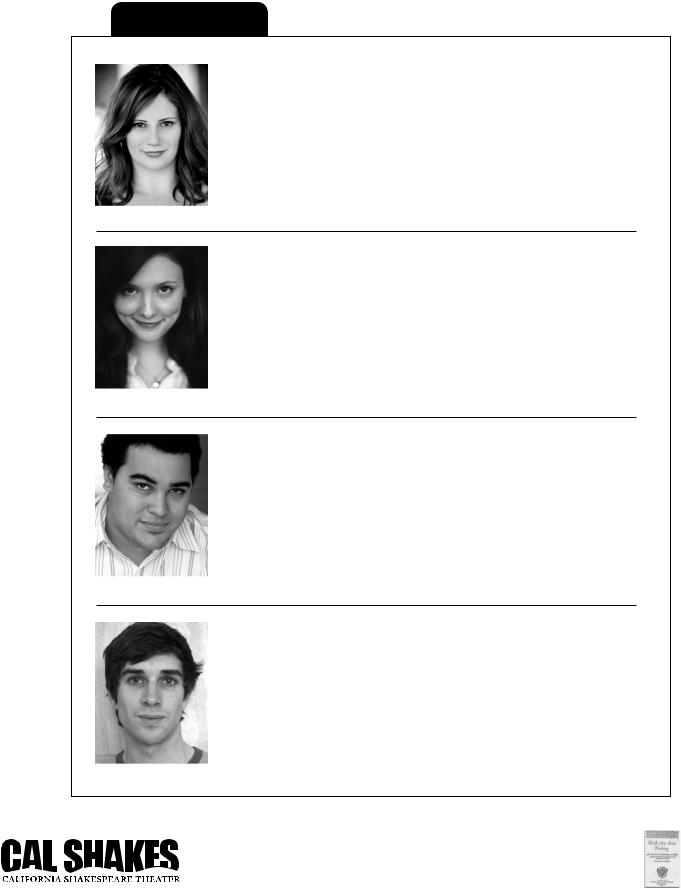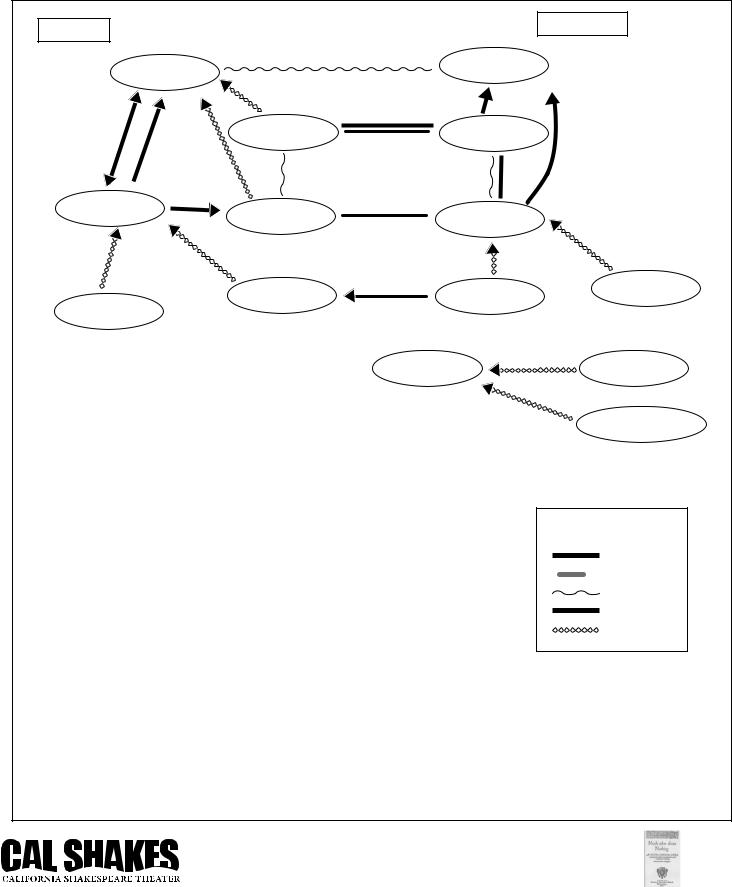
TeachersGuide_MuchAdoAboutNothing_2010
.pdf
WHO’S WHO: THEACTORS
CAST
Ensemble
Xanadu Bruggers
Ensemble
Luisa Frasconi
Ensemble
John R. Lewis
Ensemble
Justin Liszanckie
Note: Role assignments subject to change.
MUCH ADO ABOUT NOTHING OVERVIEW |
- 11 - |

WHO’S WHO:
THE CHARACTERS
ARMY
|
Don Pedro |
|
Brothers |
Soldier |
|
Benedick |
||
|
||
|
Soldier |
Don John |
Claudio |
|
MESSINA
Leonato
Niece
Beatrice
Daughter
Hero
Borachio |
Margaret |
Ursula |
|
||
Conrade |
|
|
|
|
Deputy |
Dogberry
Leonato: Governer of Messina Hero: Leonato’s daughter
Beatrice: Leonato’s niece, best friend to Hero Margaret: One of Hero’s two serving women Ursula: One of Hero’s two serving women
Don Pedro: Prince of Aragon, longtime friend of Leonato Claudio: A soldier and nobleman who loves Hero Benedick: Another aristocrat-soldier under Don Pedro Balthasar: A musician and servant in Leonato’s household. Don John: Don Pedro’s illegitimate brother.
Borachio: Don John’s servant and Margaret’s lover. Conrade: Don John’s other servant.
Dogberry: Master Constable. Verges: Dogberry’s deputy.
George Seacole: A member of the watch.
Verges
George Seacole
KEY
Family
Loves
Friendship
Hates
Serves
MUCH ADO ABOUT NOTHING OVERVIEW |
- 12 - |

SEEING THE PLAY:
BEFORE AND AFTER
“I would my horse had the speed of your tongue”
–Benedick, Act 1, scene 1
Consider the following questions before and after the show.
BEFORE Viewing the Play
How many lies can you spot?
When does language change the course of someone’s life?
Beatrice and Benedick change their minds about love several times. Why?
Really listen to Dogberry—do you understand what he’s saying?
How does his language define his character?
Look for moments that you recognize in modern life: Are the characters acting like people do today? How or how not?
AFTER Viewing the Play
Who are the main characters of the play? Are they Beatrice and Benedick or Hero and Claudio? Why?
What do you think Shakespeare is saying about people?
Much Ado About Nothing is regarded as one of Shakespeare’s comedies. The events surrounding Hero and Claudio’s wedding, however, are rather tragic. Do you regard this play as a comedy? If so, what gives the play its comedic element?
Which of the characters do you think you are most like? Why?
Think of someone you know who talks in a very distinct way. What does their language make you think about them?
Did you recognize any parts of this story from modern movies or books, or from your own life?
See “Write Your Own Critique”, pages 41 & 42, for more ideas about what to watch for and how to write about your reactions after the show.
MUCH ADO ABOUT NOTHING OVERVIEW |
- 13 - |

SHAKESPEARE’S LANGUAGE
Here are some original quotes from Much Ado About Nothing. Can you match them to their modern-day translations?
Friendship is constant all other things
Save in the office and affairs of love.
Claudio, Act 2, Scene 1
Silence is the perfect herald of joy. I were but little happy if I could say how much.
Claudio, Act 2, Scene 1
When I do name him let it be thy part
To praise him more than ever man did merit. My talk to thee must be how Benedick
Is sick in love with Beatrice
If thou dost love, my kindness shall incite thee To bind our loves up in a holy band.
For others say thou dost deserve, and I Believe it better than reportingly.
Beatrice, Act 3, Scene 3
There is a kind of merry war betwixt Signior Benedick and her: they never meet but there’s a skirmish of wit between them.
Leonato, Act 1, Scene 1
A miracle! Here’s our own hands against our hearts. Benedick, Act 5, Scene 4
For my part, I am so attired in wonder
I know not what to say.
Benedick, Act 4, Scene 1
Beatrice and Benedick seem to like fighting; whenever they get together they always try to outdo each other with jokes.
Once a good friend, always a good friend, except when love is involved.
Amazing! What we’ve written shows our true feelings.
I am so amazed that I’m speechless.
Silence reveals true joy. If I could say how happy I was, that would mean that I was only a little glad.
If you really love me, I can finally express my love to you and we can get married. Other people are telling me that you do love me, and I believe that you do even more than they say.
When I talk about him, it is your job to say really good things about him. My job is to talk about how much Benedick is in love with Beatrice.
See “Brush Up Your Shakespeare”, page 41.
MUCH ADO ABOUT NOTHING OVERVIEW |
- 14 - |

MUCH ADO
ABOUT
NOTHING:
- 15 -

WORDS CAN
BRING US TOGETHER
BEATRICE & BENEDICK
“A miracle! here’s our own hands against our hearts.”
Benedick, Act 5, scene 4
Beatrice and Benedick use words masterfully, in contrast to Claudio and Hero, who either use exaggeration or do not speak much, and in great contrast to Dogberry, who doesn’t even seem to know how to choose words correctly. Much like Kate and Petruchio in The Taming of the Shrew, these two are so well-matched verbally that everyone else in the play and the whole audience knows that they are destined to be together no matter how much they protest against it. In the following dialogue, note how each person picks up on the words (in bold) the other has used, only to craft another insult:
BEATRICE: I wonder that you will still be talking, Signior Benedick: nobody marks you. BENEDICK: What, my dear Lady Disdain! are you yet living?
BEATRICE: Is it possible disdain should die while she hath such meet food to feed it as Signior Benedick? Courtesy itself must convert to disdain, if you come in her presence.
BENEDICK: Then is courtesy a turncoat. But it is certain I am loved of all ladies, only you excepted: and I would I could find in my heart that I had not a hard heart; for, truly, I love none.
BEATRICE: A dear happiness to women: they would else have been troubled with a pernicious suitor. I thank God and my cold blood, I am of your humor for that: I had rather hear my dog bark at a crow than a man swear he loves me.
Shakespeare’s illustration of a perfect couple is unmistakable through the wordplay and oneupmanship.
For Students
Have you ever heard people who are so good with words that, even when they have arguments, you know they are somehow enjoying the fight? Insult fights, sometimes staged, are fun for this reason as well.
Write a six-line argument between Beatrice and Benedick using modern-day insults. Remember to keep it playful and fun—it should be clear that these characters actually like each other.
See “Resources: Books and Internet”, page 24, for a link to a Shakespearean insult page.
See “Go Girls!”, page 22, for further information on women and Elizabethan culture.
- 16 -
MUCH ADO ABOUT NOTHING: WORD!

WORDS CAN KILL
CLAUDIO & HERO
Hero’s entire social status depends on her reputation. Even though the play is set in Italy, it reflects English standards, and a woman in Elizabethan times had little significance in society other than that of bearing children to continue the lineage. So it is very important that she be paired with the proper man.
Unfortunately, through the brutal plan affected by Don Pedro’s brother, Don John, it is made to appear that Hero is romancing another man after she has been pledged in marriage to Claudio. This kind of behavior would make her entirely unfit to be married to a nobleman; Hero is wrongfully reviled by her groom and her whole community, with even her own father, Leonato, disowning her.
But this is a comedy, and comedies must end happily. Hero has to symbolically die to live again. She is put into hiding and pronounced dead to everyone; her father, upon learning that she is innocent, asks Claudio to marry another girl. He then puts Hero in the bride’s place—hidden under a veil—at the second wedding. This is the sad truth of a ruthlessly patriarchal society: that a woman must die in order for her virtue to be redeemed. (Years later, in Othello, Shakespeare would have the same thing happen, but with no redemption for Desdemona.)
Here’s an example of Claudio’s words to Hero on their wedding day, and then Leonato’s:
Claudio:
There, Leonato, take her back again: Give not this rotten orange to your friend; She’s but the sign and semblance of her honor…
She knows the heat of a luxurious bed… But fare thee well, most foul, most fair!
Leonato:
Wherefore! Why, doth not every earthly thing Cry shame upon her? Could she here deny The story that is printed in her blood?
Do not live, Hero; do not ope thine eyes: For, did I think thou wouldst not quickly die,
Thought I thy spirits were stronger than thy shames, Myself would, on the rearward of reproaches, Strike at thy life….. Hence from her! let her die.
Unfortunate but timely comparisons can be made to the cases of students who have had their reputation or sense of self-worth destroyed through cyber-bullying. These modern-day Heros are caught in a similar situation as Shakespeare’s: knowing the truth with no one else believing it.
For Students
Have you ever had someone say something bad about you that wasn’t true? How did it feel? Were you able to establish the truth?
Why do words have so much power when used against someone?
Think about celebrity gossip magazines and websites. How do the writers choose their headlines in order to get you to read their story? Do you believe the articles in these publications? Why or why not?
How can you figure out what is rumor and what is truth?
Name three television shows whose storylines revolve around gossip, misinformation, and rumor. (Here’s one for free: Gossip Girl.)
See “Go Girls!”, page 22, for further information on women and Elizabethan culture.
- 17 -
MUCH ADO ABOUT NOTHING: WORD!

WORD CONFUSION Dogberry
“You are thought here to be the most senseless and fit man for the constable of the watch…”
Dogberry, Act 3, scene 3
Shakespeare plays with language like a jazz musician plays with musical notes—sometimes following rules, sometimes making up new rules, and often extending a whole series of words in various forms to make a particular point. Characters in his plays use words not just to communicate, but to create a certain mood or paint a complex picture of a person or situation. On order to express their emotions in new ways, Shakespeare’s characters use every literary device we know and inventing new ones.
Poor Dogberry! He seems to love words—his speeches are full of complex and certainly interesting phrases and turns of thought—but he doesn’t seem to really understand the words that he’s saying. He consistently substitutes one word for another, creating malapropisms that usually result in a joke. Sometimes a malapropism is made by substituting an incorrect word that sounds a lot like the word that the person really means. For example: Dogberry asks his sidekick Verges not to compare things to each other by saying, “Comparisons are odorous”. He means “odious”, which means hateful or disgusting, but he instead ends up saying that comparisons are smelly. Don’t you just hate when metaphors are lying around in the garbage stinking up the place?
Another kind of malapropism is when one substitutes a word that means the exact opposite of what is intended. For instance, when Dogberry accuses the conspirator Borachio, he says, “O villain! Thou wilt be condemned into everlasting redemption for this.” He meant to say something like “condemnation,” wanting to tell Borachio that he will be punished by God for his villainy. But he uses “redemption”, meaning “rescue or recovery”, having comic effect.
Another textual indication of Dogberry’s state of mind is a seeming inability to keep things in order. For example, when listing the many offenses of the lawbreakers, he says, “moreover they have spoken untruths; secondarily, they are slanders; sixth and lastly, they have belied a lady; thirdly, they have verified unjust things; and, to conclude, they are lying knaves.”
For Students: Shakespeare Was First
The word “malapropism” comes from a play by Richard Brinsley Sheridan, The Rivals, first performed in 1775. In The Rivals, a character named Mrs. Malaprop makes the same kind of verbal mistakes as Dogberry. (Her name comes from the French phrase mal à propos, meaning not to the purpose.) But these confused and comic turns of phrase, used to such great effect by Dogberry in the 1500s, was known to Renaissance crowds as “dogberryism”.
See “Dogberryisms”, page 38, for an exercise in understanding malapropisms.
- 18 -
MUCH ADO ABOUT NOTHING: WORD!

WHAT DOES THE
TITLE MEAN?
Much Ado About Nothing is one of three plays that Shakespeare titled in a kind of off-hand or disparaging manner: As You Like It; Twelfth Night, or What You Will; and Much Ado. There are many theories about Shakespeare’s reasons for this. Perhaps he was being slightly sarcastic toward the crowds and critics who demanded ever-more pleasing plays; perhaps he didn’t value them all that much himself; or maybe he just wanted to have a little fun.
What we do know is the historical meaning of the word “nothing”. In Shakespeare’s time, “nothing” was pronounced “noting”. The title of the play would have sounded like Much Ado About Noting. “Noting” meant to “take note of”, as in being attracted to someone, and also “to eavesdrop or spy”. This play is particularly concerned with the “noting” of various characters by one another, and with the mistakes made by those who think that they are the ones fooling others. Take the masking during the dance in Act 1. Through this masquerade, we see the irony of the scenes in which Beatrice and Benedick think they are “noting” others when they, in fact, are themselves being “noted” or tricked.
Beneath this merry layer of noting, however, is a deeper level of shaming. Don John tries to shame Claudio (as someone easily tricked); Claudio shames Hero in front of a whole
congregation; Leonato links his daughter with his own sense of shamed self-devaluation (“But mine and mine I loved and mine I praised…she is fallen/ Into a pit of ink”), coming to believe thatthe only way to deal with Hero’s public humiliation is to fake her death; and Beatrice tries to shame Benedick into acting like a “man” to avenge the wronged Hero.
For these characters, reputation—being noted—is everything.
For Students: Put Yourself in Shakespeare’s Shoes
What sense do you make of the title? Imagine you had written this play about these people who care so much what others think of them: Why would you name it Much Ado About Nothing?
- 19 -
MUCH ADO ABOUT NOTHING: WORD!

ELIZABETHAN CULTURE
OVERVIEW
- 20 -
